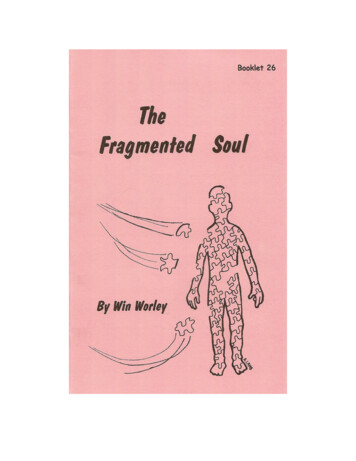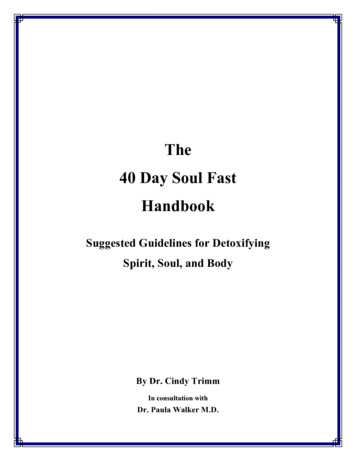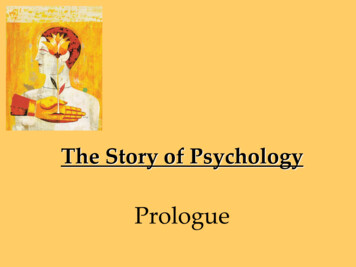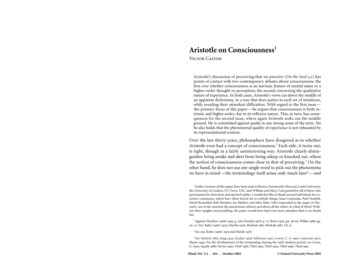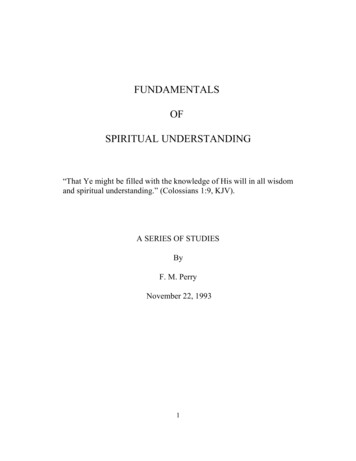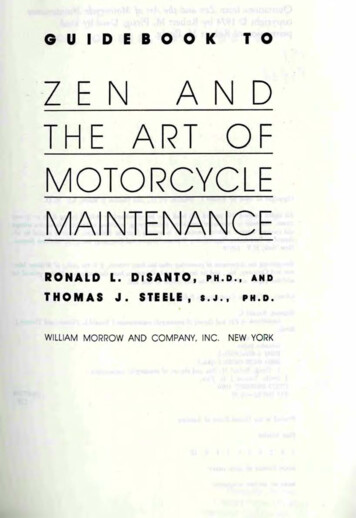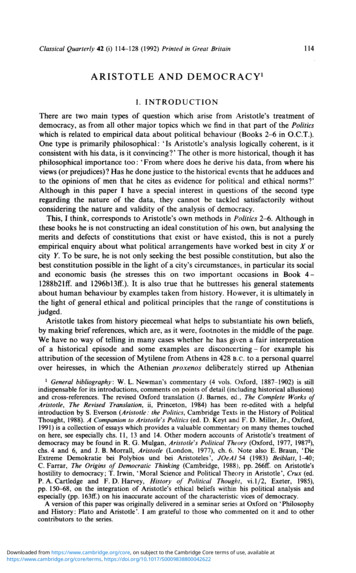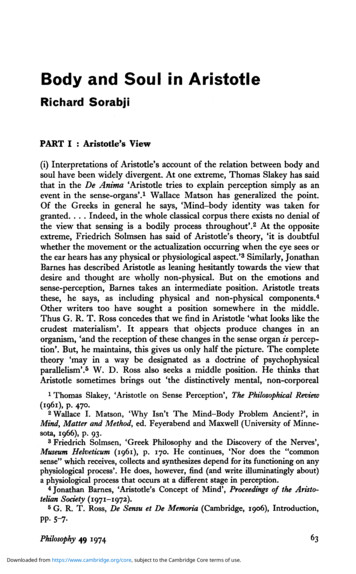
Transcription
Body and Soul in AristotleRichard SorabjiPART I : Aristotle's View(i) Interpretations of Aristotle's account of the relation between body andsoul have been widely divergent. At one extreme, Thomas Slakey has saidthat in the De Anima 'Aristotle tries to explain perception simply as anevent in the sense-organs'.1 Wallace Matson has generalized the point.Of the Greeks in general he says, 'Mind-body identity was taken forgranted. . . . Indeed, in the whole classical corpus there exists no denial ofthe view that sensing is a bodily process throughout'.2 At the oppositeextreme, Friedrich Solmsen has said of Aristotle's theory, 'it is doubtfulwhether the movement or the actualization occurring when the eye sees orthe ear hears has any physical or physiological aspect.'3 Similarly, JonathanBarnes has described Aristotle as leaning hesitantly towards the view thatdesire and thought are wholly non-physical. But on the emotions andsense-perception, Barnes takes an intermediate position. Aristotle treatsthese, he says, as including physical and non-physical components.4Other writers too have sought a position somewhere in the middle.Thus G. R. T. Ross concedes that we find in Aristotle 'what looks like thecrudest materialism'. It appears that objects produce changes in anorganism, 'and the reception of these changes in the sense organ is perception'. But, he maintains, this gives us only half the picture. The completetheory 'may in a way be designated as a doctrine of psychophysicalparallelism'.5 W. D. Ross also seeks a middle position. He thinks thatAristotle sometimes brings out 'the distinctively mental, non-corporeal1Thomas Slakey, 'Aristotle on Sense Perception', The Philosophical Review(1961), p. 470.2Wallace I. Matson, 'Why Isn't The Mind-Body Problem Ancient?', inMind, Matter and Method, ed. Feyerabend and Maxwell (University of Minnesota, 1966), p. 93.3Friedrich Solmsen, 'Greek Philosophy and the Discovery of the Nerves',Museum Helveticum (1961), p. 170. He continues, 'Nor does the "commonsense" which receives, collects and synthesizes depend for its functioning on anyphysiological process'. He does, however, find (and write illuminatingly about)a physiological process that occurs at a different stage in perception.4Jonathan Barnes, 'Aristotle's Concept of Mind', Proceedings of the Aristotelian Society (1971-1972).5G. R. T. Ross, De Sensu et De Memoria (Cambridge, 1906), Introduction,PP- 5 7Philosophy 49 1974Downloaded from https://www.cambridge.org/core, subject to the Cambridge Core terms of use.63
Richard Sorabjinature of the act [of sensation]. . . . But Aristotle cannot be said to holdsuccessfully to the notion of sensation as a purely mental activity havingnothing in common with anything physical. He is still under the influenceof earlier materialism1.6The most popular alternatives have been to regard Aristotle as some kindof materialist, or as some kind of Cartesian. But, as we shall see, there havebeen other assimilations. I believe that all these interpretations are mistaken,and that Aristotle's view is something sui generis. It is not to be identifiedwith the positions of more recent philosophers. Moreover, when we seewhat his view is, we shall find that it has interesting implications of its own.But first, by way of background information, I must make two preliminarypoints about Aristotle's concept of the soul.(ii) Preliminaries: the soul as capacities. Aristotle sometimes thinks ofthe soul as a set of capacities, such as the capacity for nutrition, the capacityof sense-perception and the capacity for thought. These capacities are nota mere conglomeration, but are related to each other in intimate ways, soas to form a unity. The lowest capacity (nutrition) can exist without thehigher ones, but not vice-versa.According to Aristotle's best-known definition, the soul is the form, orfirst actuality, of a natural body with organs (DA I I . i, 412319; b5). But itis not always noticed that he regards this definition as insufficientlyinformative. He calls it an 'impression' or 'sketch', and a 'very generalstatement'. But it would be ridiculous, he says, to give a general definitionof the soul, to the neglect of definitions that pick out the particular kinds ofsoul, the soul of a plant, a beast, or a man (DA I I . 1-3, 41237; b4; bio;41339-10; 4i4b25 8; b32-3). An account that does pick out the variouscapacities by which living things differ from each other will in fact be themost appropriate account of the soul (DA II. 3, 415312-13). And with thisstatement at the end of DA II.3, he provides the plan of the rest of theDe Anima. For the rest of the work considers in turn the capacity fornutrition, the capacity of sense-perception, the related capscity of imagination, the cspacity for thought, 3nd the cspacity for volunt3ry movement.Aristotle's st3tement, that the most appropriate account of the soul is theone which picks out these cspscities, already suggests the thought thatperhaps the soul just is these capscities. This thought is confirmed when wenotice that Aristotle spesks of the capscities 3S parts of the soul (e.g.DA 4i3b7; b27 32; 429310-13; 432319; DM 44( 5; 450317). It isconfirmed again when, using one of his technical terms, Aristotle calls thesoul a first actudity (DA 412322-8). For 3 first sctuslity is 3lso describsble3S a second potentiality (DA 4i7a2i-b2), in other words 3s 3 cspscity.6W. D. Ross, Aristotle (Methuen, 1923; Meridian Books edition, 1959),P- 13564Downloaded from https://www.cambridge.org/core, subject to the Cambridge Core terms of use.
Body and Soul in AristotleThe interpretation is also confirmed by Aristotle's claim that the relationof soul to body is parallel to that of sight to the eye. 7I shall follow Aristotle below, by thinking of the soul as a set of capacities.The conception does, incidentally, have one great advantage, namely thatwe undeniably have a soul of the kind Aristotle describes. At least, we havea soul, if this means that we have the capacity to grow, perceive and think.But it must be admitted that Aristotle sometimes adds the difficult ideathat we have a capacity to perceive and grow which explains our perceivingand growing. 8(iii) Preliminaries: the biological conception of the soul. The word 'soul'may sound archaic to some modern ears, and people may be tempted tosubstitute the word 'mind'. But then they are likely to confine the functionsof the soul to what we call mental acts, and this will take them away fromAristotle's conception of the soul. In all this, people have been influencedby Descartes. He explains that previously the word 'soul' (anima) hadbeen applied to the principle of nutrition as well as to the principle ofconsciousness (cogitatio). But he will use the word only for the latter, and,to avoid confusion, will, whenever possible, substitute the word 'mind'(mens).9Aristotle's conception of the soul is much broader than this. He takes theview which Descartes castigates, that the nutritive processes are a functionof the soul. Plato and others had attributed a soul to plants. 10 Plato had7DA 412 7-41333. Willie Charlton and Professor Wiggins have pointed outthat Aristotle sometimes thinks of the soul as that which has capacities, i.e. theperson (Charlton, Aristotle's Physics Books I and II (Oxford, 1970), pp. 70-73;Wiggins, Identity and Spatio-Temporal Continuity (Blackwell, 1967), part 4,sec. 2). This observation is illuminating, especially for the study of Metaphysics,Book VII. But it must be insisted that sometimes, and in the De Anima often,Aristotle thinks of the soul as being the capacities themselves. He is not thinkingof the soul as that which has capacities, when he says that a person is angry withhis soul (4o8bi-i5), or that the soul is the cause of living, and the efficient causeof perception and growth, and that only what partakes of soul perceives (4i5b8-288It is easy to understand Aristotle's idea that our capacity for desire explainsour moving from place to place (DA III.9-10). But it is harder to see how thecapacity to perceive can explain our perceiving, or how the capacity to retain acertain distinctive organization while we grow can explain our retaining thisorganization while we grow (DA 4 2 3 - 2 8 ; 41638-9; D21-22).9Reply to objections brought against the 2nd Meditation, §4, in the 5thObjections, translated Haldane and Ross, vol. II, p. 210.10Plato Timaeus 77A-B. Empedocles believed he had in a previous incarnationbeen a bush (fragment 117 in Diels, Die Fragmente Der Vorsokratiker). It mayhave been because of his belief that souls could be reincarnated in plants thatEmpedocles forbade the eating of beans (fr. 141). But members of the Orphicsect allowed that some or all vegetable food lacked a soul (Euripides, Hippolytus952)E65Downloaded from https://www.cambridge.org/core, subject to the Cambridge Core terms of use.
Richard Sorabjicoupled this view with another current view, that plants had sensationsand desires.11 Aristotle retains the first idea, that plants have souls, butsensibly rejects the second, that they have sensations and desires. Instead,he makes sensation the distinguishing mark of animals. But how, then,does he justify continuing to attribute a soul to plants? By extending theconcept of soul, so that the non-conscious processes of nutrition andgrowth will now count as an activity of the soul. This extension maysound strange to us. But appeal to a (non-conscious) soul is needed,Aristotle thinks, to do justice to such facts as that a plant does not expandhaphazardly, but preserves, or develops, a certain distinctive organization.12The resulting conception of the soul makes it coextensive with life, that is,with all life. The conception of soul is a biological one, and it encouragesAristotle to stress the continuity, rather than the differences, betweenprocesses in plants and processes in humans. Descartes was wrong, in thepassage referred to at the beginning of this paragraph, when he ascribedthe connection between the soul and nutritive processes to the earliestmen. The connection is in fact an innovation of Aristotle's, though it maywell be true that Aristotle's predecessors, other than Plato, already ascribedto the soul functions which were not mental ones.13Though Aristotle makes plant growth a function of the soul, he does nottake the next step. He does not attribute the movements of earth, air, fire11Plato Titnaeus 77A-B. Put into the mouth of Protagoras by Plato, Theaetetus167B. Asserted, if we can believe our late sources, by Empedocles, Democritusand Anaxagoras (see pseudo-Aristotle, De Plantis 815316; bi6; Sextus Empiricus,Adv. Math. VIII, 286, using as evidence Empedocles, fr. no. Cf. fr. 103).12See, e.g. DA 41636-9. A plant also produces seed for the next generation.And this must be done by converting the nutriment it draws from the soil (seeG. & C. I.5; DA II.4).An excellent account of Aristotle's biological extension of the concept of soulis given by Solmsen in the American Journal of Philology, he. cit., note 69 below.13A major function of the soul, among early Greek philosophers, was to causemotion {DA 4O3b26; 405b! 1; 409 19). Did the soul always cause motion bymeans of some mental activity? Aristotle implies not in the case of Democritus(DA 4o6b24-25), though in this particular instance Aristotle's testimony issuspect. According to another conception, the function of the soul was notconnected with consciousness in this life, but was simply to survive, perhapswith a very low level of consciousness, when a man died (see R. B. Onians, TheOrigins of European Thought (Cambridge 1951), for such a conception in Homer).For Plato, one function of the soul was to cause motion, but it caused motionby means of some mental activity (Laws 896E-897A). I do not believe thatTitnaeus 36E says otherwise.66Downloaded from https://www.cambridge.org/core, subject to the Cambridge Core terms of use.
Body and Soul in Aristotleand water to a soul within them, 14 presumably because the four elementsare lifeless things. But although the four elements do not have souls tomove them, there are analogies between the movement of elements, thegrowth of plants, and the movement of animals. All three are processesdirected towards an end, and all three are due to nature, which in PhysicsI I . i is defined as an internal cause of change (io.2b2o). There is thedifference that the nature, or internal cause, is not a soul or a desire, in thecase of the four elements. But this only raises the question how the naturethat resides in the elements differs from a plant soul or from the desire ofanimals, a difficult question which we shall encounter again (p. 83). ThePhysics offers no satisfactory answer, but an answer can be pieced togetherfrom Aristotle's later works. 15(iv) The contrast with Descartes. We can now return to the rival interpretations of the body-soul relation in Aristotle. Some of the interpretations14 y fyy.I IyI'yi I' Aristotle would have had some precedent, if he had attributed the motionof the elements to desire or to a soul. For Empedocles spoke of the four elementsmoving on account of desire or love for each other (frr. 21.8; 22.5; 62.6).Plato's Timaeus (52D-53A) allowed movement of the four elements, without thepresence of soul, his Laws (897A) was ambiguous on the point, but his Phaedrus(245E) declared that whatever has an internal source of motion is ensouled. In alater age, Descartes was to complain that the scholastic tradition had created inthe concept of gravity a sort of pseudo-soul (Reply to 6th set of Objections,sec. 10, HR. vol. II, pp. 253-257. For Descartes' own view, see Principles ofPhilosophy III. 56 and IV. 20-27). But this was neither the fault of Aristotle, norof St. Thomas Aquinas. For though St. Thomas speaks of the four elementsmoving on account of desire (desiderium, appetitus) for their preservation (Commentary on Aristotle's Physics 2o8bo,, and Summa Theohgiae I a II a e , q. 94, a. 2),he carefully explains away a similar way of talking about the desire {appetitus) ofmatter for form (Commentary on Aristotle's Physics 192322).15The Physics hints at analogies (192822; 250 4). But it fails completelywhen it tries to spell out the disanalogies (25535-20; b29 3i). A good accountof this failure is again given by Solmsen in Aristotle's System of the PhysicalWorld, loc. cit., note 69 below.According to later writings, desire in animals differs from the nature of astone, in that it involves a physiological process in virtue of which desire is acause of motion (DA 1.1; Mot. 6-10). It also differs in being intimately linkedwith other soul capacities, with nutrition, which maintains the organs in theright state, and with perceiving, imagining, conceiving and judging. For (Mot6-8; 11; DA III.9-11) an animal must perceive, imagine, or conceive the enddesired, and, in some cases, the means to its realization. A human being mayalso make a judgment that the end or means conceived is to be pursued, or not.Desire differs again, in that desires have varying ends (Metaph. IX.5; Cael.II.12), some of them conflicting (NE VII.3, Bekker's numbering), somechangeable by training (NE II. 1), some being only apparent goods, not realgoods (NE III.4). Downloaded from https://www.cambridge.org/core, subject to the Cambridge Core terms of use.67
Richard Sorabjiattribute to Aristotle a Cartesian strand. Solmsen and Barnes attachimportance to the fact that Aristotle makes perception an act of the soul.But given Aristotle's biological conception of the soul (which Solmsen hasdone so much to bring out), this tells us that perception manifests life, notthat it manifests consciousness. G. R. T. Ross finds significance in Aristotle's calling perception an energeia and entelecheia. But when Aristotleinsists that perception is an energeia and an entelecheia, rather than a pathos(DA 417314-16; b2-i2), he has in mind that it is an actualization of adisposition and that the subject of this actualization is not destroyed butpreserved and fulfilled. When Aristotle says that perceiving is an energeia,rather than a kinesis (Metaph. 1048 8-36; NE 1174314-459; DS 446b2-3),he means that processes are incomplete until they reach their end, but withactivities like perceiving one can say 'I have perceived' right from the verybeginning. These points do not imply that perceiving is 'something mental'(p. 5) or 'an act of mind' (p. 6). Living can be called an energeia, even whenwe are talking of the non-mental life of a plant. W. D. Ross attaches importance to the passage we shall discuss below where Aristotle says thatsmelling is something else besides (para) a physical change (DA 424332bi8). But Ross assumes without warrant that if there is 'something else',it can only be conceived of as distinctively mental. His second piece ofevidence is that Aristotle sometimes speaks of perception as involvingdiscrimination. But here too Ross assumes without warrant thatdiscrimination can only be conceived of as something distinctivelymental.Turning to the case on the other side, we should notice that Aristotlehas no word corresponding to 'mental act', or to Descartes' cogitatio(consciousness). Charles Kahn has suggested that the nearest word isaisthanesthai (perceiving), for this covers a very wide range of mentalacts.16 Nonetheless, as Kahn carefully points out, the word does notcorrespond to Descartes' cogitatio, for Aristotle draws a sharp distinctionbetween thinking and perceiving. He never suggests that thinking is a kindof aisthanesthai. Nor, as we shall see, does he say of aisthanesthai the sort ofthings that Descartes says of cogitatio.In a very un-Cartesian way, Aristotle insists that, in some sense of 'is',every mental act is a physiological process. Thus anger is a boiling of theblood or warm stuff around the heart, in a sense of 'is' analogous to that in16In Aristotle, pleasure and pain (PA 666ai2), awareness of memory-images(DM 450 4; 16; 18; 28); awareness of one'sown acts of sense-perception (Som.455317; DA 425 2; NE ii7oa2o-bi); awareness of being asleep (Insom.46233). In other authors, desire, fear, and intellectual discernment. For thereference to Kahn's article (which is basic reading for this subject), see note 69.68Downloaded from https://www.cambridge.org/core, subject to the Cambridge Core terms of use.
Body and Soul in Aristotlewhich a house is bricks (DA 4O3a25-ba).17 The point is made about allpathe of the soul, the examples in this chapter being anger and calmness,confidence and fear, loving and hating, appetite, pity and joy.18 And it isalso made about two activities that Aristotle hesitates19 to call pathe,perception and thought, though it is at first made only tentatively20 aboutthought. The point is not made about long-term states (hexeis), or capacities(dunameis) of the soul.21 And at one place Aristotle says it is thought to bea mark of the pathe rather than of the hexeis that they are corporeal (NEH28bi4-i5). Nonetheless, he does often speak-as if hexeis and dunameistoo had some kind of physiological basis.22The statement that anger is a physiological process does not initiallysound very Cartesian. But Cartesian interpreters of Aristotle may take17Aristotle does not list this as a distinct sense of 'is', when he talks about thedifferent senses of the verb to be. But he still treates this use of 'is' in a distinctiveway. He notes that ordinary speakers prefer to say that a thing is composed ofwood (Metaph. 1033816-19), or better (1033319-22) is wooden, rather than that itis wood. And he has reasons of his own, to be discussed on p. 78, for doing likewise, and refusing to say that a thing is its matter (Metaph. 103537-10; iO4ibi216).18Other examples of pathe of the soul are envy, emulation, longing, shame andshamelessness, kindness and unkindness, and indignation at unmerited prosperity (NE no5bi9-28; 1128D9-15; Rhet. II.2-11; EE I22obio-2o). The semiphysiological analysis is mentioned also at DS43636-10; b i - 8 ; DM450327-30;Sotn. 45437-11, and is connected with yet other mentsl states, desire in general,pleasure and pain, memory and memory images.For the claim that anger is a bodily process, see DA 403326. In making allpathe of the soul physiological, Aristotle is rejecting the claims of Pkto Philebus34B; 35C; 47E.19See 40333 for the name pathe. But Aristotle sometimes prefers to talk ofthem as things the soul does (poiein 40337), or as functions of the soul (erga403310).20Eventuslly it emerges thst all humsn, 3S opposed to divine, thinking involvesimsgery, 3nd hence a physiological process (DA 43iai6; b2; 43238; 313;DM 449b3i).21For the distinction see NE 1105 9-28; 110633; a 5 ! IX 57b28-3i; EEI22obi3-i4; Rhet. 1378320; Cat. 8b26-9ai3; 9b33 iO3io. Pathe of the soul(e.g. 3nger) 3re 3ccomp3nied by plessure or pain, 3nd sffect one's judgment.We 3re S3id to undergo chsnge (kineisthai) when we have them. They are not theresult of deliberate choice. They are comparatively short-lived and easilyremoved. A hexis of the soul (e.g. good temper) is something in accordance withwhich we are well or ill disposed in relation to pathe. A dunamis of the soul (e.g.the ability to be angry) is that in accordance with which we are capsble ofsuffering pathe.22For examples, see Theodore Tracy, Physiological Theory and the Doctrineof the Mean in Plato and Aristotle (Mouton, 1969), passim; Sorabji, Aristotle onMemory (Duckworth, 1972), notes on 44gb6 and 453319.69Downloaded from https://www.cambridge.org/core, subject to the Cambridge Core terms of use.
Richard Sorabjicourage from Aristotle's insistence that the physiological process is only thematter, or material cause, of anger. There is also a form, or formal cause,namely the desire to retaliate. And anger can be said to Ac23 this formalcause, or desire, just as a house can be said to be a shelter. This statement in4O3a25-bo, is reinforced at 424 3-18, where Aristotle says that exercisingsmell is something else besides {para, 424 7-19) merely being affected bysomething. It is also a matter of aisthanesthai. In view of the wide use ofaisthanesthai, we may take the word as meaning awareness. And we maytake the point to be that smelling is not simply a matter of being affectedby odour, but is also an awareness of odour. The Cartesian interpretermight now read into these two passages the idea that anger or smelling hastwo components (cf. Barnes pp. 107; 113). The physiological process isone component; the other is a purely mental act of desire or awareness.This interpretation is impossible for two reasons. First, the form of athing is not a component in it. A shelter is not a component in a house.Aristotle explains this carefully in the Metaphysics. His examples are asyllable, a house, and flesh. These are composed respectively of letters, ofbricks, and of the four elements. But the form is not a further component.The arrangement of the letters B and A, for example, is not a component inthe syllable BA {Metaph. 104 19-33; io43b4-6). On the contrary, it ismatter, not form, which constitutes the components. This is how matter isdefined {Phys. 195319; Metaph. io32ai7). There is a second objection tothe Cartesian interpretation. Even if there had been a component in angerother than the physiological process, that component could not have beena purely mental act. For Aristotle, no acts are purely mental, since everypathos of the soul is, among other things, a physiological process.The Cartesian interpreter must not look, then, for a purely mentalcomponent in anger. His only hope lies in finding Aristotle treating angeras a whole as a distinctively mental act, in spite of its also being a physiological process. But it is no longer very clear what it means to call somethingdistinctively mental, if one is at the same time calling it physiological. It istrue that many recent materialists, in talking of the identity of mental statesand brain states, have spoken as if this were possible. But Richard Rorty isright in taking them to task.24 The materialist view, as he points out, shouldbe expressed by saying, 'what we thought to be mental acts may after allbe physiological processes instead'. If one calls anger a physiologicalprocess, one cannot continue to call it distinctively mental. Or if one does,one is departing from a Cartesian concept of mental acts, and will thenhave to explain what one means by 'mental'. For Descartes, mental23A pathos of the soul is an enmattered form (403325), just as a house is a form(4O3b6). Again, anger is a movement of a faculty (desire?), as well as being aphysiological movement (403326-27).24Richard Rorty, 'Incorrigibility 3s the Mark of the Mental', The Journal ofPhilosophy (1970), esp. p p . 399-406.70Downloaded from https://www.cambridge.org/core, subject to the Cambridge Core terms of use.
Body and Soul in Aristotleactivities have no affinity (affinitas) with bodily activities.25 And the minditself has properties which are actually incompatible with those of thebody, for the body is extended and divisible, the mind neither extendednor divisible.26Aristotle is unlike Descartes in several fundamental ways. For one thing,the topic of self-awareness does not play the same role in his account of thesoul. Descartes defines the mind as a conscious being (2nd Meditation,HR I, p. 152), and consciousness (cogitatio) as 'all that is in us in such away that we are immediately aware (conscii) of it'.27 Because of this, thenotion of self-awareness is central in Descartes' view of the soul. ButAristotle's remarks on self-awareness are brief, sporadic, and by no meanscentrally placed. The topic did not have the same interest for him. Hismost Cartesian remark is perhaps the one in the Physics, when he says thata change of quality in the sense-organs of a living thing differs from achange of quality in a lifeless thing, in that it does not go unnoticed(Phys. 244 5-24532). He also suggests, though sometimes only in an'if-' clause, that one is inevitably aware of one's own perceiving, thinking,and remembering (DS 437327-9; 448326-8; DA 425 2; NE 1170329-bi;DM 452b26-8). But in several wsys Aristotle's remarks on self-awsreness3re unlike Descartes'. First, he does not seem to hold consistently to theclaims about self-3W3reness that we have just referred to. 28 Secondly, heis just as ready to entertain the ide3 that one is inevitably aware of one'sown walking (NE 1170330). And there is no attempt to make self-awarenessa distinguishing mark of mental 3cts, by protesting, with Descartes, thatawareness of one's own walking is not immediate (loc. cit. note 27), or bydistinguishing between the corporeal set of walking snd merely seemingto walk.29 Thirdly, Aristotle's view of how one is aware of one's own seeingis rather surprising. For DA 425b 12-25 equates the question of how we areaware that we sre seeing (425S12; bi3), or, in other words, how we areaware of our sight (425b 13; bi6), with the question of how we are 3W3reof the organ that sees (to harm, 425 9; b22). This implies that it is through25Reply to objection on the 2nd Meditation, in the 3rd set of Objections,H R I I , p . 64.266th Meditation, H R I, p p . 190 and 196, and Passions of the Soul, article 30,H R I, p . 34S.27Reply to 2nd Objections, Definition I, see H R I I , p . 52.28Processes (kineseis) in the sense-organs, and images (phantasmata) can afterall pass unnoticed, according to Insont. 46ob28 46ia8; 461819-22, and accordingto an argument (whose conclusion, however, Aristotle rejects) at DS 447a! 2-b6.Moreover, DM 45132-5 admits that a m a n m a y b e remembering, in spite ofbeing in doubt whether h e is.292nd Meditation, H R I, p . 153; Principles of Philosophy 1.9, H R I, p . 222;Reply to objections on t h e 2nd Meditation, §§ 1 and 9, in t h e Replies to t h e 5thObjections, H R I I , p p . 207 a n d 213.71Downloaded from https://www.cambridge.org/core, subject to the Cambridge Core terms of use.
Richard Sorabjiawareness of the organ that we are aware that we are seeing. He goes on toremind us that the organ is coloured during the perceptual process (425D22—25),30 and presumably we will be aware of its coloration.31 This colorationis a physiological process, which could in principle, even if not in practice,be seen by other observers, using ordinary sense-perception. So what oneis aware of on these occasions does not sound like a Cartesian act of mind.The only concession to a Cartesian way of thinking—and it is not a verybig concession—comes when Aristotle says that the perceiver does notsimply see his own organ and act of seeing (DA 425 7-22; Som. 455317),but is aware of it in a different manner.32There is another way in which Aristotle is fundamentally unlike Descartes. He does not divide up the world at the same points. We havealready noticed that he does not treat mental acts as a single group, butmakes a sharp distinction between perception and thought. Nor does hefollow Descartes in trying to separate off from the group nutrition (note 9),30For the view that the organ takes on colour when we see, v. DA 42437-10;425D22-24; 42738-9; 435322-24; 417320; 41833; 42237; 422334; 423D30;424318; 424D2; 429315; 434329. T h e first four passsges suggest 3 literal tskingon of colour. T h e theory has been misunderstood by modern commentators. I t isthe kore, which takes on colour (DA 431317-18; HA 4 9 i b 2 i ; PA 653b25), notthe eye 3S 3 whole, which would indeed be 3n absurd theory, 3s ProfessorHamlyn and Jonathan Barnes say it is (Hsmlyn, 'Aristotle's sccount of Aesthesisin the De Anima,' Classical Quarterly (1959), p p . 9 3nd 1 1 ; Aristotle's De Anima,Books II and HI (Oxford, 1968), p p . 104 and 1 1 3 ; Barnes, op. cit., p . 109).Aristotle's theory would still be absurd, if the kort were t h e pupil, as all recentEnglish translators of the psychological works suggest (Besre, Hamlyn, H 3 m m o n d ,Hett, Hicks, G . R. T . Ross, Smith). But the kore is in fact the eye-jelly inside theeye (DS
Body and Soul in Aristotle The interpretation is also confirmed by Aristotle's claim that the relation of soul to body is parallel to that of sight to th7e eye. I shall follow Aristotle below, by thinking of the soul as a set of capacities. The conception
